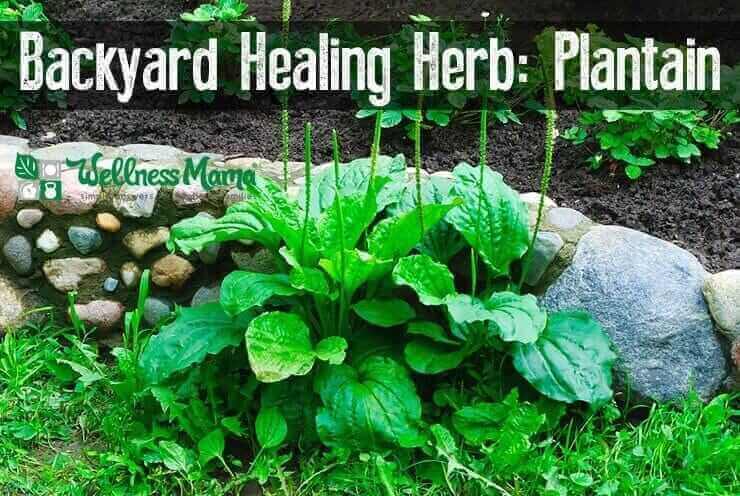Plantain is one herb that I literally would not be without. It grows in abundance in our yard so we use it fresh during the warm seasons and dry and freeze for use in the winter. I make salves with it for calming bug bites, rashes and burns and it works wonders.
What is Plantain?
Plantain, or Plantago Major, is a common backyard herb with broad leafs. Most people think of it as a weed, though it is an incredibly useful herb. According to Mountain Rose Herbs:
“Legend has it that Alexander the Great discovered it and brought it with him back to Europe in 327 BCE. It has been referred to as the Whiteman’s Foot by Native Americans, as wherever they went, it seemed to spring up. and in some places, it is seen as a noxious, invasive weed. It is, however, a useful little plant. It has been used by many cultures the world over, and the Saxons considered it one of their nine sacred herbs.
It was considered an early Christian symbol of the path followed by the devout and many cultures today refer to it as an aphrodisiac. The leaves are quite edible, and often used raw in salads and cooked as greens. Older leaves have a stronger, sometimes objectionable flavor, and can be tough and stringy, but can be used to make tea.
Plantain is very high in vitamins A and C and in calcium. Medicinally, Native Americans used plantain leaves to relieve the pain of bee stings and insect bites, stop the itching of poison ivy and other allergic rashes, and promote healing in sores and bruises. Plantain tea can be used as a mouthwash to help heal and prevent sores in the mouth, and as an expectorant. Most recently, plantain is being marketed as a stop smoking aid, adding one more use to the list of ways that this versatile herb is useful.”
“Plantain has been used as a panacea in some Native American cultures and with some very good reasons. Many of its active constituents show antibacterial and antimicrobial properties, as well as being anti-inflammatory and antitoxic. The leaves, shredded or chewed, are a traditional treatment for insect and animal bites and the antibacterial action helps prevent infection and the anti-inflammatory helps to relieve pain, burning, and itching. There is some investigation ongoing to study its affects on lowering blood sugar.
The Many Uses of Plantain:
Plantain leaf can be made into a tea, tincture or infusion and used internally (according to Practical Herbalism):
- To help get Cholesterol to healthy Levels
- To aid those with Diabetes
- For Hemorrhoid relief
- To help relieve Irritable Bowel Syndrome
- To help calm the bowels during Constipation or Diarrhea
- To sooth kidney and bladder problems and to aid with Bladder infection, ITIs and similar problems. Safe for children
- For indigestion and ulcers
Plantain Leaf is also very soothing on external inflammation:
- Bites
- Stings
- Rashes
- Eczema
- Psoriasis
- Burns
- Cuts
- Yeast
- Varicose Veins
How to Use Plantain:
If fresh plantain grows in your yard, you can make sure it has not been sprayed by pesticides or pets and use in teas or the young leaves in salads.
For stings and bites, make a poultice of fresh plantain leaf and bentonite clay with water to form a paste. It will take away the pain immediately when placed on the bite or sting. If you don’t have the other ingredients nearby, just chew up a leaf of plantain and spit on the bite. It sounds gross but greatly relieves the pain.
An infusion or strong tea of plantain leaf (dried or fresh) sprayed on a sunburn will cool the burn and relieve the pain. This will also help sooth rashes and reactions from Poison Ivy, Oak or Sumac. To make an even stronger remedy, steep plantain leaf (fresh or dried) in apple cider vinegar for a few weeks and then strain. The infused vinegar will sooth itching, burning and pain on the skin very quickly.
A cup of plantain tea from fresh or dried leaves will sooth indigestion, heartburn or IBS. It is calming on all types of digestive disturbances. It is also helpful for UTIs, Bladder infections or kidney infections.
I make a salve of Plantain and other herbs to speed healing of wounds and use in place of antibiotic cream. Recipe soon.
You can also get pre-made Plantain tincture, tea, or healing salve to have in your purse or first aid kit when needed.
NOTE: Plantain is generally considered a safe herb but as with anything, consult your doctor before using if you have any kind of medical condition. It should not be used in place of medical attention when needed.
Other Backyard Foraging
- Sumac – a lemony tasting plant used in tea or tinctures for multiple benefits
- Dandelions – make a powerful liver-cleansing tea or add to salad
- Chickweed – make a skin-soothing salve!
Ever used Plantain? Seen it in your yard and thought it was a weed? Share below!




Leave a Reply